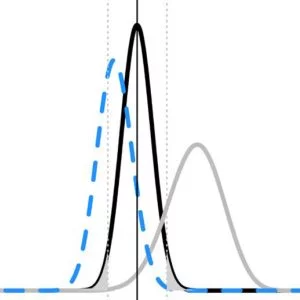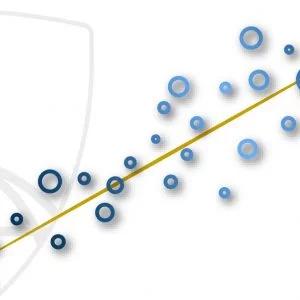
This course focuses on one of the most important tools in your data analysis arsenal: regression analysis. Using either SAS or Python, you will begin with linear regression and then learn how to adapt when two variables do not present a clear linear relationship. You will examine multiple predictors of your outcome and be able to identify confounding variables, which can tell a more compelling story about your results. You will learn the assumptions underlying regression analysis, how to interpret regression coefficients, and how to use regression diagnostic plots and other tools to evaluate the quality of your regression model. Throughout the course, you will share with others the regression models you have developed and the stories they tell you. At Wesleyan, distinguished scholar–teachers work closely with students, taking advantage of fluidity among disciplines to explore the world with a variety of tools. The university seeks to build a diverse, energetic community of students, faculty, and staff who think critically and creatively and who value independence of mind and generosity of spirit.
Instructor Details
Courses : 4
Specification: Regression Modeling in Practice
|
42 reviews for Regression Modeling in Practice
Add a review Cancel reply
This site uses Akismet to reduce spam. Learn how your comment data is processed.

| Price | Free |
|---|---|
| Provider | |
| Duration | 15 hours |
| Year | 2015 |
| Language | English |
| Certificate | Yes |
| Quizzes | Yes |

FREE






Rahul K –
This is the only course on SAS(structured) available for free till date
Vijai K S –
I enjoy this course so far. I like how the course entirely depends on peer grading. It will help us to get some honest feedback on our research.
Alex S –
This was another strong course from Wesleyan, and well produced. However some of the weekly problems were vague and it was not clear exactly what was being sought or how they would be evaluated, as they have been very clear in the previous mini courses in this specialization.
Bakr G –
As with all Coursera courses, there is no way to communicate with the tutors, which is vey important in such a specialised course. The course also requires finishing assignments while needed clarification and explanation is not always provided in the course videos. in some assignment a required step was only explained in the following week (Centering variables). Assignments review depend only on peer review, when peers in most of the time don’t read through assignment completely or open attachments leading to poor grading based on ‘missed information’ that are actually attached in submissions. Also this course along with the rest of the courses in the Data Analysis and Interpretation need some more focus on using SAS and other data analysis tools and the way to present results in a more appealing way. (this could be given one extra lecture in each course).
Zacharias P –
Very nice lecture videos and explanations! Totally worth it
Franzi S –
I truly enjoyed this course and I learned a lot. I particularly liked the structure and setup. My suggestions for improvement would be to provide more background information and further reading on the subjects covered and to maybe have a handout that summarizes the most important concepts and key messages of each week.
Roland K –
I would do it again, even if there was no tutor support in discussion forums it teaches the arguments very good.
Miyuan –
too easy
ngoduyvu –
v
MANOJ K –
Awesome course. Thanks Prof. I am expecting more courses.
Sabah R –
The course contents are unfortunately very poorly designed, and this has been an ongoing trend in this overall specialization. The weekly lecture videos are at times quite unclear and leave more questions unanswered than they answer. I (and other learners) have found glaring gaps in the course content again and again. The examples that the lecture videos use do not nearly cover the variety of datasets being used by the learners in the course; and the least that could have been done is to at least inform learners of what to expect if they were dealing with a different research question and using an alternate dataset. I know the defense may be that the videos are meant to be introductory / gateway to a deeper understanding of that particular topic. The course moderators / instructors did a terrible job in keeping up with answering key questions that were posted in the discussion board. Yet most of the times when I was still searching for answers, looking up similar introductory videos in Youtube were far more helpful (and I didn’t have to pay to watch them). The assignments are poorly worded because the instructions are not always very clear, which in my opinion set up a lot of learners including myself for failure. The lectures are often broader than what should be considered when finishing the weekly assignment. It wasn’t even clear at times of what was exactly being expected in the assignment. The rubric that I had to use to mark my peers’ work meant their analysis had gaps because the criteria for assessment is not transparent AT ALL during the submission of an assignment (they are starkly different in terms of details). All to say that I have been quite frustrated despite my best efforts to learn from these materials and much MUCH more can be done to improve the actual content of the lectures. Please consider adding alternate resources AS WELL where learners can go seek the right answers if the answer is not provided by the lecture materials. This can help to cut back on countless precious hours for those who are juggling a full time job and retraining / career change like I am, not to mention the countless other scenarios of other learners out there. I am neither inattentive nor lazy, and learning this content is very important to me, if it wasn’t clear through my comments here already. One last comment, for those of you who are all very sceptical let me tell you that I know that I don’t have to be a statistician to grade the course contents, and I really hope the intructors are paying attention to these and similar comments from those enrolled in this specialization and the others who have completed the course.
priya x –
Good for understanding concepts and running code in SAS but still needs more depth to the coursework.
Craig S –
I learned a few things. The videos were good. The feedback from the student reviews was erratic. There was some good, thoughtful feedback and some was nonsense. I took the free option. I don’t think I’d ever pay for a course where evaluations are conducted by people who understand the material no better than I do. This is the second course in this series that I completed. I also finished the machine learning course. I think I’m done with this specialization.
David W –
Great but too much stock video footage of people smoking.
Sandra M –
There is a lot of self teaching with these courses because there are no professors present to reach out to with questions. In addition, the course staff do not always respond promptly nor are they fully knowledgeable about all aspects of error messages that may arise out of coding. At times the code that were provided in the lecture videos were out of date and a lot of time was spent on googling to find the updated code. This is definitely not a beginner coder course and I do not recommend it to anyone who has not coded before.
Sergio A G G –
I really like this training. It’s good if you want a good view of applied regression.
priyasmita g –
The course was very shallow as if teaching english literature
Monika K –
I think you will get a lot out of this course/specialisation if you don’t expect to be spoon fed. I have seen comments here stating that only one dataset is used per course, not covering all the other options available. This is because you are supposed to understand the concepts presented to you and apply them to your own set and ideas. The same in terms of grading: you should know whether your code throws up mistakes, how to fix those and whether your conclusions make sense. It’s preparation for the real world: the onus is on you to seek alternative sources of help at time (like stackflow), to correct your mistakes, to understand whether the result makes sense. Your classmates are only there to keep you to the deadline. In real life no one will hold your hand. Concepts are explained very well, I am finding it easy to complete two courses simultaneously quite quickly. Great specialisation.
Jason M –
Similar to other courses in this specialization, the material is very nice (although slightly easy and straightforward), but the course instructors do not moderate the discussions enough to make them a useful tool. Especially when I’m paying for the specialization, I would appreciate responses to my questions.
Nitin K –
Good Course. To the point and clean lectures.
Arnold A –
Again, great job!
Victoria –
Extremely boring and not
Ali R –
simple and useful
Abdullah A M A –
great effort was paid preparing this course .
Ricardo M –
Assignmetns allow student to choose dataset and analysis but are not very well structured. Detailed exaplanations.
Bruno R B –
Excelente curso!
Paul C –
This was a great course. I’ve done a few in the area of stats, regression and machine learning now and the Wesleyan ones are the most well rounded of all of them
Meigui Y –
This is a great beginner level course for those have no programming experience. But I would suggest the content to be extended to 8 weeks instead of 4 weeks.
Jinbo C –
easy to follow
kwangje.baeg –
Background Sound is awesome haha
bourges –
Very clear and documented videos, ability to choose between two differents statistical software: python and sas
Gopisankar M G –
great course , a must for all science students
Glenn B –
really enjoyed it
Aneeshaa S C –
course could’ve had more depth. expected explanation on more data scenarios. for example, logistic regression when the explanatory variables are quantitative. even interpretation of output. course is too brief. barely gives you an introduction to the subject.
Amin F –
This specialization was great up to this course! All the content are reviewed superficially and it seems the instructors are just trying to teach recipes and there is no intuitive explanations, especially on multiple regression and the tests for evaluating it.
Dina I –
It needs hard work and a lot of practicing 🙂
Ruben D S P –
Great classes. You need all of the content to manage data.
Aurimas D –
unbalance course. in my opinion simple topics were over explained and difficult topics were under explained. I personally would prefer to know more about regression in the first place and only then try to adapt them to the data. perhaps it my lack of knowledge.
Mukkesh G –
This course is really an eye opener. I had no idea statistics would be this much fun! The way the course is set up is just beautiful. Concepts are clearly explained, and they give you such a good insight into the world of data science. Definitely gonna recommend this to a lot of people
Ponciano R –
Good course with a lot of applicable techniques. Thanks for your time and teachings!
Enyang W –
The course itself was nice, but the review for the assignments was really annoying, I always had to wait sooo many days..
Robertas P –
I liked the course. I would recommend it to others. Do not have any complains. However, I recommend you to consider making the grading procedure more granular, and providing an example sketch of how the exercise reports may look.